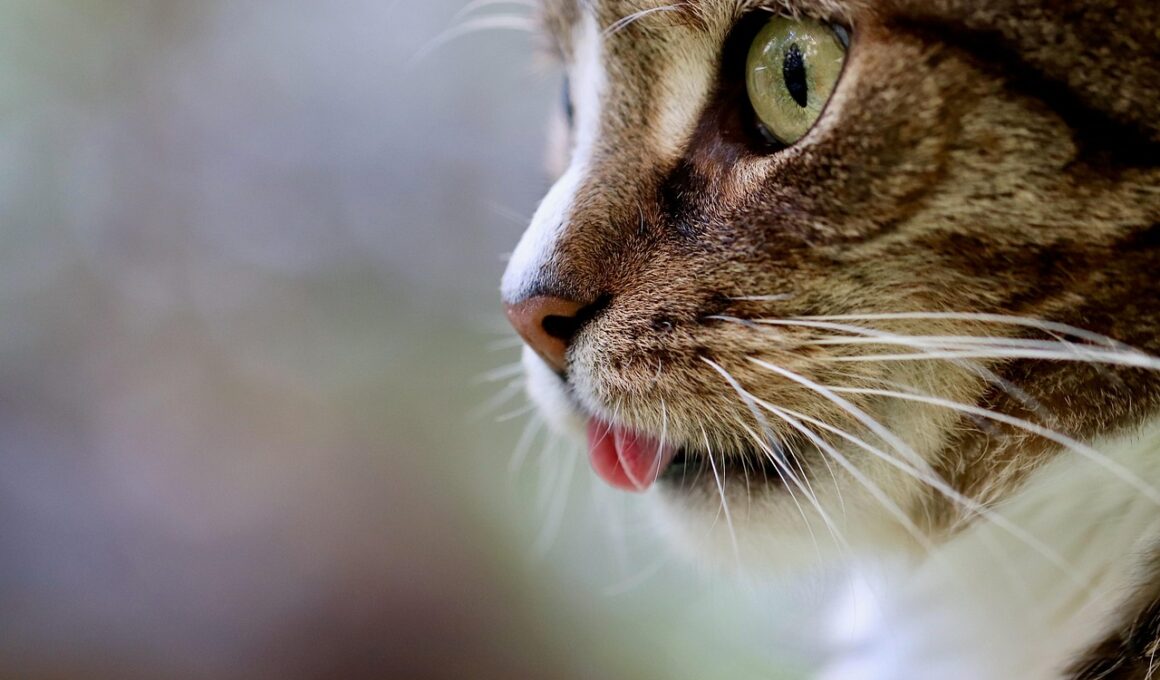Behavioral Genetics: What Breeders Should Know About Cats
Understanding the behavioral genetics of cats is essential for breeders who want to enhance positive traits in their breeding programs. The study of these genetics reveals how different genes influence behaviors, such as sociability, playfulness, and aggression. A knowledgeable breeder can leverage this information to select breeding pairs that are likely to produce desirable traits in their offspring. Recognizing that behavior can be hereditary means breeders must be aware of both parental behavior and genetics. For instance, a kitten raised in an environment that encourages social interaction may develop more outgoing characteristics, enhancing its appeal to potential adopters. Conversely, genetic predispositions towards fearfulness or aggression can hinder a kitten’s development, affecting its future in a home setting. One crucial factor is the understanding that temperament can vary widely even among kittens from the same litter. Therefore, breeders should conduct behavioral assessments before pairing cats for breeding. This knowledge can help establish a breeding program focused on producing well-adjusted, temperamentally sound kittens that thrive in their future homes and interact positively with people and other animals.
Breeding programs thrive on careful selection of parent cats, which should be based not only on physical attributes but also on behavior. An important discovery in behavioral genetics is that certain traits have a strong genetic link. Breeders need to be vigilant in studying family trees; understanding the behavioral traits of both parents can help predict the characteristics of their kittens. For instance, if one parent displays high levels of playfulness and sociability, these traits may be passed on to the offspring, resulting in a litter of energetic, friendly kittens. This understanding emphasizes the importance of maintaining detailed records of behavioral traits across generations. Moreover, environmental factors also play a pivotal role in shaping behavior. Kittens raised in stimulating environments often develop better social skills, making it essential for breeders to create engaging living conditions. Bonding experiences, early socialization, and exposure to various stimuli are crucial; they all contribute to the overall behavioral development of the kitten. Thus, breeders should not only focus on genetic traits but also ensure that their cats are nurtured in an enriching environment that encourages the development of positive behaviors.
Influence of Early Environment
The early environment of a kitten has profound implications for its behavioral development, often leaving lasting impressions. Factors such as socialization and exposure to different stimuli can shape a cat’s personality significantly. For example, kittens that experience varied interactions with animals, humans, and environments tend to develop better social skills. Early socialization windows are critical, typically occurring between two and nine weeks of age, where experiences form the basis for future behavior. Breeders should aim to expose their kittens to diverse scenarios during these formative weeks. Activities may include gentle handling by different people, interactions with friendly dogs, or even playtime with various toys. The goal is to create a well-rounded kitten that is adaptable and confident. Furthermore, adequate exposure helps reduce fear-based behaviors in adult cats, making them more suited for placement in busy households. It’s important for breeders to create a positive and stimulating environment that encourages exploration and interaction, ensuring that each kitten is both behaviorally sound and sociable. Thus, understanding the impact of early experiences is vital for breeders committed to ethical practices and nurturing feline well-being.
Genetics and behavior are intricately linked in cats, with specific genes appearing to play roles in defining particular traits. Breeders must familiarize themselves with these genetic components to make informed decisions. For instance, certain studies suggest that the presence of specific genes can lead to independent or affectionate behaviors. By recognizing these traits, a breeder can strategically select breeding pairs to amplify positive characteristics in their line of cats. However, understanding the genetic basis of behavior requires thorough research and educational resources. The importance of continuing education for breeders cannot be overstated; staying informed on the latest discoveries in feline genetics is vital. Engaging with communities, attending workshops and consulting genetic experts are practical steps for breeders. Likewise, collaborating with veterinary professionals significantly enhances the breeding outcome by providing insight into inherited disorders and temperament assessment. By maximizing the knowledge of both genetics and behavior, breeders can focus on their mission to produce healthy, well-adjusted cats. These practices also help elevate the overall reputation of cat breeding as a responsible and sustainable endeavor, thereby promoting better standards for feline companions in our society.
Assessing Behavioral Traits
A key aspect of breeding is the assessment of behavioral traits in potential breeding cats. This process involves observing interactions and the responses of cats in various environments. Considerations include examining how adult cats react to novel stimuli or engage with their surroundings. Behavioral assessments can provide insights into a cat’s temperament, which may be passed along to offspring. Common traits to observe include playfulness, fearfulness, and adaptability to change. A well-rounded behavioral assessment should be comprehensive and includes both a positive socialization experience and a stress-response evaluation. Identifying cats that demonstrate desirable behavior patterns can inform pair selection for breeding. An effective strategy is to use behavior assessment tools or standardized tests to enable comparison among potential candidates. Breeders should also take into account how external factors, such as prior trauma or under-socialized backgrounds, may have influenced current behavior. Selecting partners with positive traits can lead to litters that consistently exhibit healthy behaviors, setting them on a good path for successful adoption into family environments. Positive behavioral traits ultimately contribute to the overall health and happiness of cats in future homes.
Furthermore, understanding the influence of selective breeding on behavior is essential to breed responsibly. While breeders may desire specific characteristics, they must be cautious of inbreeding, as it can amplify problematic behaviors or genetic conditions. Diverse gene pools can help preserve cognitive abilities and prevent behavioral issues often associated with inbreeding. It is recommended that breeders utilize genetic testing as a way to identify potential issues before they manifest in kittens. Breeding programs should therefore prioritize genetic health alongside behavioral traits to promote the wellness of the breed. Responsible breeders need to be transparent about their breeding practices and histories to potential adopters, ensuring they receive all necessary information about their new companion. This transparency helps foster trust and allows owners to prepare for the specific needs of their cats. A strong commitment to ethical breeding practices not only benefits the animals involved but also enhances the breeder’s reputation. Ultimately, establishing a connection between behavior, genetics, and breeding is central to the overall goal of producing happy, healthy cats that thrive in homes and enrich the lives of their guardians.
Future Research Directions
Future research in feline behavioral genetics is crucial for advancing our understanding of cat behavior and enhancing breeding practices. Areas of interest include investigating the relationships between environmental conditions and genetic predispositions that shape behavior. As research charts new territories, insights can lead to improved policies and recommendations for breeders. For example, studies on the genetic basis of anxiety or aggression in cats can pave the way for breeding strategies that minimize these behaviors in future litters. Collaborating with geneticists and animal behaviorists may present opportunities for innovation in breeding practices. Exploring genetic variations and their implications on temperament could also yield a wealth of information contributing to the development of breed standards. It’s essential for breeders to stay informed about ongoing research, as it can significantly impact breeding programs. Moreover, empowering future generations of breeders with this knowledge can foster a culture of responsibility and commitment to the welfare of feline companions. The integration of new scientific findings during breeding will encourage ethical practices, leading to healthier, happier cats in the long term. Embracing future research could significantly enhance feline behavioral development and breeding efficiencies.
In conclusion, the understanding of behavioral genetics is fundamentally important for cat breeders aiming to improve their breeding programs. Breeding responsibly requires the conscientious selection of parent cats based on genetic and behavioral assessments. By recognizing that temperament can have hereditary components, breeders can make informed decisions that positively impact future generations of cats. Ensuring an enriching environment for kittens during critical developmental periods allows for optimal behavioral outcomes. Moreover, with increasing awareness regarding the genetic links to behavior, breeders can develop programs that emphasize the importance of socialization and environmental interactions. Continuous education and an emphasis on research remain integral for advancing the field of cat breeding. Collaboration with veterinary and genetic experts fosters responsible practices, ultimately reflecting a commitment to animal welfare. As prospective cat owners increasingly seek well-adjusted and healthy companions, breeders must prioritize positive behavioral traits alongside genetic soundness. The balance between nurturing the innate qualities of cats and guiding their development through early socialization will lead to successful breeding outcomes. In the end, informed breeders fostering these ideals can contribute greatly to the overall health and well-being of cats within society.


